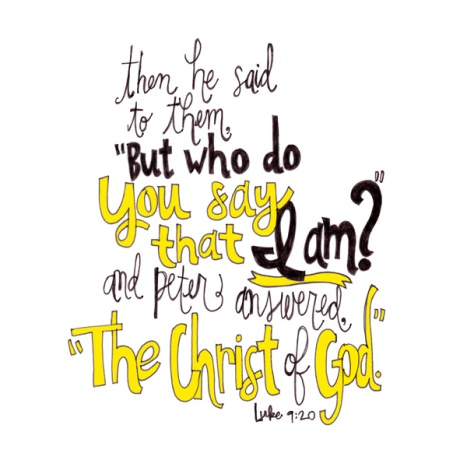But he said to them, “How can they say that the Christ is David’s son?” Luke 20:41
These few days are laced with music. Roving bands of singers and musicians are not uncommon during Passover week, but the mood this year is uncommonly light. The city fizzes with anticipation, knowing something momentous is in the works. He may wait until after the Passover feast to declare himself—or why not during? Passover means deliverance, and behold, it is at hand; who could keep from singing?
The Lord declared to my Lord,
‘Sit at my right hand
Until I make your enemies your footstool.’*
A cobbled-up children’s choir, blown in like blossoms and led by someone’s older sister, sing in his presence:
Rule over your enemies, call up your people on the day of battle;
In holy splendor, from the womb of dawn,
Rise up in the dew of your youth—
For the Blessed One has sworn, and will never disavow,
‘You are a priest forever, in the line of Melchizedek,
The LORD stands at your right hand
Ready to crush kings, judge nations, pile up the dead.
Refresh yourself from sparkling springs
And lift up your head!*
Their order breaks down as the song ends. Giggling and blushing, they stammer out, “Blessings on you, Son of David!” before running away in all directions.
Charming, think the followers. Disturbing, think the scribes, who have sung the identical psalm any  number of times with no more than a theoretical understanding. But now it is looking at them—or is it?
number of times with no more than a theoretical understanding. But now it is looking at them—or is it?
“Tell me,” The Nazarene asks his audience: “why do they say Messiah is the son of David?”
His followers merely gaze at him dumbly, like sheep.
“Well,” one of the scribes begin (with some hesitation, suspecting a trap), “David was promised a successor who would reign forever, and . . .”
“How can David himself call him ‘my Lord,’ as you just heard in the Psalm, if Messiah is his son?”
The people keep on grinning, delighted with this rhetorical flourish, but the scribes know it isn’t a flourish. He claims to be greater than David, their greatest king. This can lead to no good. Irksome as the Pharisees are, insufferable as the Sadducees, they all must align in a common cause.
The teacher is clever, they’ll give him that, and more than that—the teacher is profound and wise and infuriating and attractive and repulsive and . . . something entirely outside their experience.
Ultimately though, he’s a great trouble. He is on a collision course with reality. Real kings crush pretend kings every time and the collateral damage is horrendous: often counted, as every son of Israel has reason to know, in the multiples of crosses strung along the roads. Better one casualty than dozens, or hundreds. For the sake of many, one must die.
*Psalm 110, commonly understood as a Messianic prediction
___________________________________
For the original post in this series, go here.
<Previous
Next>


 number of times with no more than a theoretical understanding. But now it is looking at them—or is it?
number of times with no more than a theoretical understanding. But now it is looking at them—or is it?
